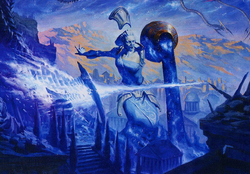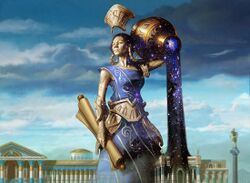Ephara
| Ephara | |
|---|---|
| God of the Poleis | |
| Information | |
| Colors |
|
| Species | God |
| Birth, Life & Death | |
| Birthplace | Theros |

Ephara is the God of the Polis on the plane of Theros. As a deity associated with both white and blue mana, she embodies the ideals of law, civilization, scholarship, and civic order. Among the pantheon of Theros, Ephara stands as a guardian of cities and a patron of societal advancement, particularly revered in the enlightened polis of Meletis.
Description
Ephara is the god of city-states, architecture, and organized human endeavor. She is most closely linked to the establishment and flourishing of the polis, the urban center of community life on Theros. She represents the ideals of collective progress, civic wisdom, and social cooperation. Her domains include law, scholarship, industry, and the artistic expressions that celebrate urban life, especially architecture, sculpture, poetry, and public discourse.
Depicted as a colossal Nyxborn being, Ephara's divine form is often a massive animated statue adorned with a stone crown resembling the capital of an Ionic column. In one hand, she carries a scroll symbolizing wisdom and recorded law; resting on her shoulder is a large vessel — possibly a pithos or a hydria — from which a shimmering, starry liquid flows, representing the divine essence of Nyx. When appearing among mortals, she may take the form of a stately human woman garbed in blue and white, with a serious yet benevolent expression.
Ephara is strongly associated with daytime, particularly midday, when cities are most alive with activity. Her followers often pray during the working hours of the day, accompanied by the sounds of construction, trade, and civic life. These rituals underscore Ephara's belief that daily labor and collective achievement are sacred.
Influence and Worship
As god of the polis, Ephara is seen by her worshipers as the founder of civilization itself. She is credited with establishing the first code of law, still preserved in Meletis and emulated by other cities across Theros. Her divine influence guides the growth, protection, and enlightenment of cities, helping them reach their highest potential as centers of knowledge, art, industry, and governance.[1]
Though revered throughout the plane, Ephara's cult is strongest in Meletis, whose citizens consider her their divine patron and protector. Temples to Ephara often serve as public forums, educational centers, and places of civic gathering. Worship typically involves brief midday services with prayers and lectures by civic or industrial leaders. Her iconography is widespread: her face adorns stone walls and public buildings, often serving as a silent witness to oaths, arguments, and public discourse. Locals believe she discourages dishonesty in her presence, and many minor disputes are resolved simply by invoking her name.
Relationships
Ephara maintains a number of complex divine relationships. She is ideologically aligned with Heliod, the god of the sun, as both value law, structure, and justice. She also respects Thassa, god of the sea, recognizing the necessity of water in sustaining civilization. Her appreciation for craftsmanship creates mutual respect with Purphoros, whose forgework supports the infrastructure of cities.
In contrast, Ephara's opposition to Nylea, god of the hunt and wilderness, is one of deep mutual resentment. Where Nylea sees natural beauty and balance, Ephara sees untapped potential for human advancement. To Ephara, wild lands represent chaos and stagnation, while to Nylea, the city is a defiling blight.
Her rivalry with Phenax, god of deception, is particularly bitter. Ephara views Phenax's manipulation and subversion of social order as an existential threat to everything she builds and protects. While she tolerates differing divine views, she sees no redeeming value in Phenax's deliberate undermining of justice, cooperation, and truth.
Her relationship with Karametra is more complicated. Ephara values agriculture as essential to city life, and both deities seek to protect their communities. However, Karametra's association with the wild-leaning city of Setessa and her closer ties to Nylea put her at odds with Ephara's urban ideals.
Goals
Ephara's divine mission is the foundation and preservation of civilization. She champions the growth of cities, the establishment of fair governments, and the promotion of education and the arts. Her followers are often architects, philosophers, scholars, judges, lawmakers, and civil servants. Ephara encourages vigilance against internal threats such as tyranny and corruption, not just external danger. She teaches that justice and civic responsibility are the cornerstones of a thriving society, and that every citizen has a role to play in the betterment of the whole.
Through her divine scrolls, which lengthen with each discovery or civic achievement, Ephara records the progress of mortals. Every innovation in law, art, or science is seen as an extension of her will and a contribution to the divine blueprint of a perfect society.
History
According to myth, Ephara once bestowed magic upon the people of Meletis, granting them the power to overthrow the cruel Archon Agnomakhos, an oppressive tyrant who had ruled the city. This act is remembered as a turning point in Meletian history and a foundational moment for Ephara's worship.
In a later divine conflict, Ephara was responsible for the destruction of Cacophony, a newly born god who had begun to claim dominion over cities. Deeming his presence a threat to the social harmony she upheld, Ephara personally ended his existence.[2]
During the cosmic event known as the Silence of the Gods, enacted by Kruphix, Ephara — like her fellow deities — withdrew her direct presence from the world.[3] Yet her influence never waned, as civic life and public order continued to function under her enduring legacy.

During the New Phyrexian Invasion, Ephara appeared briefly in the vision of Elesh Norn, seen defending Theros from incursion. Though she was not among the three gods compleated by New Phyrexia, Ephara actively aided in the defense of her people. She blessed the champions of Theros with divine flame — a Nyx-infused substance known as godfire — which burned without fuel and symbolized divine resistance.[4][5]
Inspiration
The character of Ephara is inspired by a partial aspect of Athena, the Greek goddess of civilization, and the city of Athens (traditionally said to be named after her). To further support this analogy, the familiars she sends to her thaumaturges have the shape of owls, animals sacred to Athena. She is portrayed with a jar with flowing water on her shoulder, much like the Aquarius, usually associated with Ganymede. She also bears a resemblance to Hera in her capacity as a goddess of civilization; Hera was also associated with the sign of Aquarius that Ephara evokes.
Gallery
Story appearances
In-game references
- Represented in:
- Associated cards:
- Depicted in:
- Quoted or referred to:
References
- ↑ Wizards RPG Team (2020), D&D Mythic Odysseys of Theros, Wizards of the Coast
- ↑ Ken Troop (April 23, 2014). "Dreams of the City". magicthegathering.com. Wizards of the Coast.
- ↑ Jenna Helland (April 2014). "Theros: Godsend, Part I." Wizards of the Coast. ISBN 978-0-7869-6556-4.
- ↑ K. Arsenault Rivera (March 16, 2023). "March of the Machine - Episode 1: Triumph of the Fleshless". magicthegathering.com. Wizards of the Coast.
- ↑ Flavortext for Urn of Godfire
External links
- The Magic Creative Team (January 29, 2014). "The Gods of Born of the Gods". magicthegathering.com. Wizards of the Coast.
- Marshall Sutcliffe (January 29, 2014). "The Gods of Born". magicthegathering.com. Wizards of the Coast. Archived from the original on 2020-08-05.
- Mike McArtor (March 24, 2014). "Born's Gods". magicthegathering.com. Wizards of the Coast. Archived from the original on 2021-04-29.

